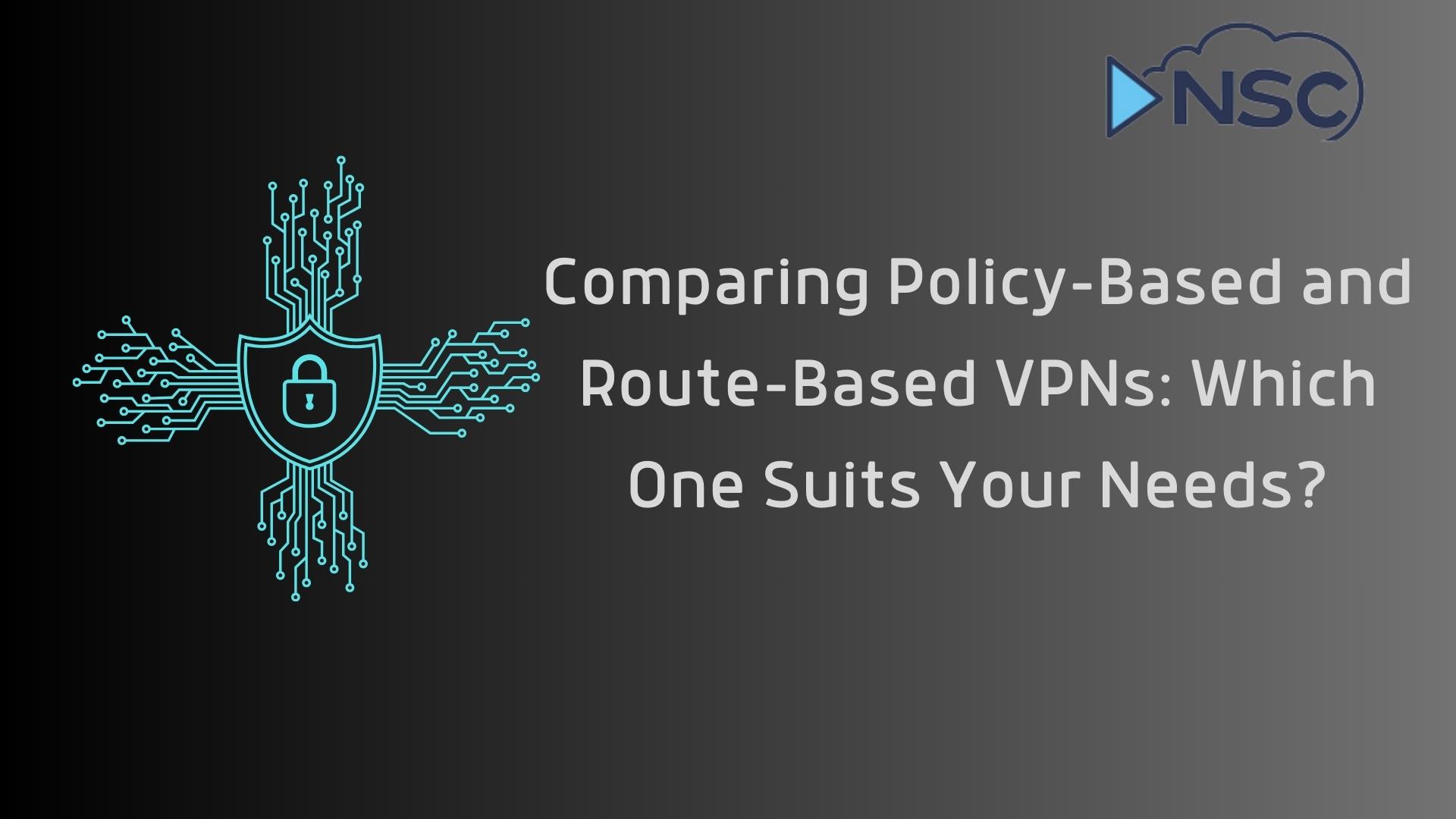In today's interconnected world, Virtual Private Networks (VPNs) are essential for securing private network traffic over the internet. While there are various types of VPNs, this article focuses on two primary configurations: policy-based and route-based VPNs. Each type offers distinct advantages and challenges, suited for different network security requirements.
Policy-based VPNs operate by defining policies that dictate which traffic should be encrypted and sent through the VPN tunnel. These are generally simpler to configure but might lack flexibility in handling dynamic routing changes.
On the other hand, route-based VPNs use routing tables to direct traffic through VPN tunnels. This approach offers greater flexibility and is better suited for complex networks with frequent route changes.
In this detailed comparison, we will explore the key features, benefits, and limitations of both types of VPNs. By understanding their differences, you can make an informed decision on which VPN configuration best fits your network's security needs.
Understanding VPNs
A Virtual Private Network (VPN) is a technology that creates a safe and encrypted connection over a less secure network, such as the internet. VPN technology was primarily used to secure remote access to a private network. Today, it is widely used to protect data transmissions, bypass geographical restrictions, and ensure anonymity online.
Types of VPNs
VPNs can be categorized into several types beyond the scope of policy-based and route-based configurations. These include SSL VPNs, IPsec VPNs, and more, each designed for specific scenarios and needs. Understanding the broad range of VPN technologies helps in selecting the right type for specific applications.
Policy-Based VPNs
Policy-based VPNs define specific policies that determine which traffic is eligible for the VPN tunnel based on IP addresses, protocols, or ports. This method involves creating access control lists (ACLs) that specify which traffic should be encrypted. This approach is typically easier for simple setups where changes in routing are minimal.
For those interested in practical applications and detailed configurations, the Cisco ASA Firewall 9.x by Ahmad course provides comprehensive insights and step-by-step guidelines.
Pros of Policy-Based VPNs
The main advantage of policy-based VPNs is their simplicity in configuration. They are ideal for situations where the network's traffic patterns are stable and predictable, making them a straightforward choice for many small to medium-sized businesses. Another benefit is that they can be less resource-intensive, as they do not require maintaining dynamic routing information.
Cons of Policy-Based VPNs
However, the simplicity of policy-based VPNs comes with limitations. They lack flexibility in dynamic environments where network traffic frequently changes. Since the policies are static, any change in the network layout or traffic patterns requires manual reconfiguration of the VPN policies, which can be cumbersome and error-prone.

Route-Based VPNs
Route-based VPNs differ fundamentally from their policy-based counterparts by relying on routing tables rather than defined policies to direct traffic through VPN tunnels. This method uses dynamic routing protocols to adjust to changes in the network, making it highly adaptable and suitable for complex network environments.
For a deeper dive into this technology and its configurations, consider exploring the JNCIP-ENT Course, which covers essential skills and techniques.
Pros of Route-Based VPNs
The primary advantage of route-based VPNs is their flexibility and scalability. They can automatically adjust to changes in network topology, which is particularly beneficial for large enterprises or networks with frequently changing routes. Another significant benefit is their ability to support multiple VPN paths, enhancing redundancy and network resilience.
Cons of Route-Based VPNs
However, this flexibility comes at a cost. Route-based VPNs are more complex to configure and manage than policy-based VPNs. They require a deeper understanding of routing protocols and network design, which might pose a challenge for organizations with limited IT resources.
Comparison and Contrast
Major Differences
The major differences between policy-based and route-based VPNs lie in their operational approach and flexibility. Policy-based VPNs use static rules to manage traffic through the VPN, making them simpler but less adaptable. In contrast, route-based VPNs utilize dynamic routing, which allows them to efficiently handle changes in the network environment without manual intervention.
Decision Factors
When deciding between policy-based and route-based VPNs, consider the following key factors:
- Network Complexity: Route-based VPNs are better suited for complex networks with dynamic changes.
- Management Resources: Policy-based VPNs require less management and are more straightforward, ideal for smaller teams.
- Scalability Needs: For growing networks, route-based VPNs offer better scalability and flexibility.
- Security Requirements: While both provide robust security, the dynamic nature of route-based VPNs can offer enhanced security through more versatile traffic management.
|
Feature |
Policy-Based VPNs |
Route-Based VPNs |
|
Operational Method |
Uses static policies to direct traffic |
Uses dynamic routing protocols to manage traffic |
|
Flexibility |
Less flexible; requires manual updates for network changes |
Highly flexible; automatically adjusts to network changes |
|
Complexity |
Simpler to configure and manage |
More complex due to dynamic routing requirements |
|
Scalability |
Better suited for smaller, stable environments |
Ideal for large or growing networks with frequent changes |
|
Resource Intensity |
Generally less resource-intensive |
May require more resources to maintain dynamic routes |
|
Ideal Use Case |
Small to medium-sized businesses with predictable traffic patterns |
Large enterprises or networks with high connectivity demands |
|
Security |
Robust security, suitable for stable networks |
Enhanced security potential due to adaptable traffic management |
|
Management Resources |
Requires less technical knowledge for management |
Requires in-depth understanding of routing protocols and networks |
Summary
In this blog, we've explored the distinct differences between policy-based and route-based VPNs. Policy-based VPNs are well-suited for simpler, more predictable network environments where policies can be set once and require minimal changes.
They offer ease of setup and maintenance, making them ideal for small to medium-sized businesses. On the other hand, route-based VPNs provide the flexibility and scalability necessary for complex networks, adapting automatically to changes and supporting multiple routes and redundancies.
Choosing the right VPN depends on your network's specific needs, including its complexity, growth potential, and security demands. Understanding these needs and aligning them with the capabilities of each VPN type will ensure optimal performance and security.


